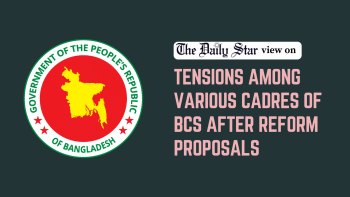Secretariat fire demands answers and action

We are alarmed by the massive fire that ravaged parts of a nine-storey building within the Secretariat complex in Dhaka. According to a report by this daily, the fire—which broke out in the early hours of Thursday—persisted for nearly 10 hours, thus fully or partially damaging the offices of at least five ministries and divisions across multiple floors. Among the casualties were not just furniture and office equipment, but many documents and records as well. Tragically, a firefighter also died while setting up hose pipes as he was run over by a truck before traffic to the area was closed. The incident has naturally shocked many, as it lays bare the lack of security in one of the country's most important public infrastructures.
The question is, was this merely a result of electrical malfunctions, or was there something more sinister? Since the incident, a number of theories have surfaced as officials and the public try to wrap their head around what happened. One theory that is making the rounds at present is a suspicion of foul play, fuelled particularly by Adviser Asif Mahmud's revelation that evidence of significant financial irregularities was among the lost documents. The student platform that spearheaded the July uprising also called the incident "an act of sabotage," while Bangladesh Administrative Service Association hinted at deliberate arson—allegedly orchestrated by corrupt bureaucrats linked with Awami League to derail ongoing reform efforts and destabilise the government. However, calmer heads within the administration want to wait before pointing fingers as investigations are underway.
Regardless of the suspicions floating around, one thing that we can say with certainty is that there were lapses in fire security that contributed to the catastrophe. Reports reveal that firefighting efforts at the Secretariat complex were hindered by significant logistical challenges both outside and within the building, delaying firefighters' response and efforts. We also need to talk about why, in this day and age, a digital record-keeping system that could minimise the loss of important records remains underutilised. This may be a testament to the corruption and inefficiencies that plagued the previous regime's digitisation drive, but a transition to digital archiving and communications should have been a priority for the interim government. Going forward, we must address these safety issues to safeguard critical infrastructure and information.
As we await the findings of investigations, which we expect the probe committees will deliver as soon as possible, it is vital that the authorities learn from this latest setback for the administration that is already struggling amid protracted unrest over civil service reforms and decisions surrounding promotions and placements. The Secretariat also must review security protocols thoroughly and adopt robust fire safety measures. Whether the fire was a result of conspiracy or complacency, it has exposed vulnerabilities that cannot be taken lightly. We must prevent a repeat of such incidents in the future.


 For all latest news, follow The Daily Star's Google News channel.
For all latest news, follow The Daily Star's Google News channel. 










Comments